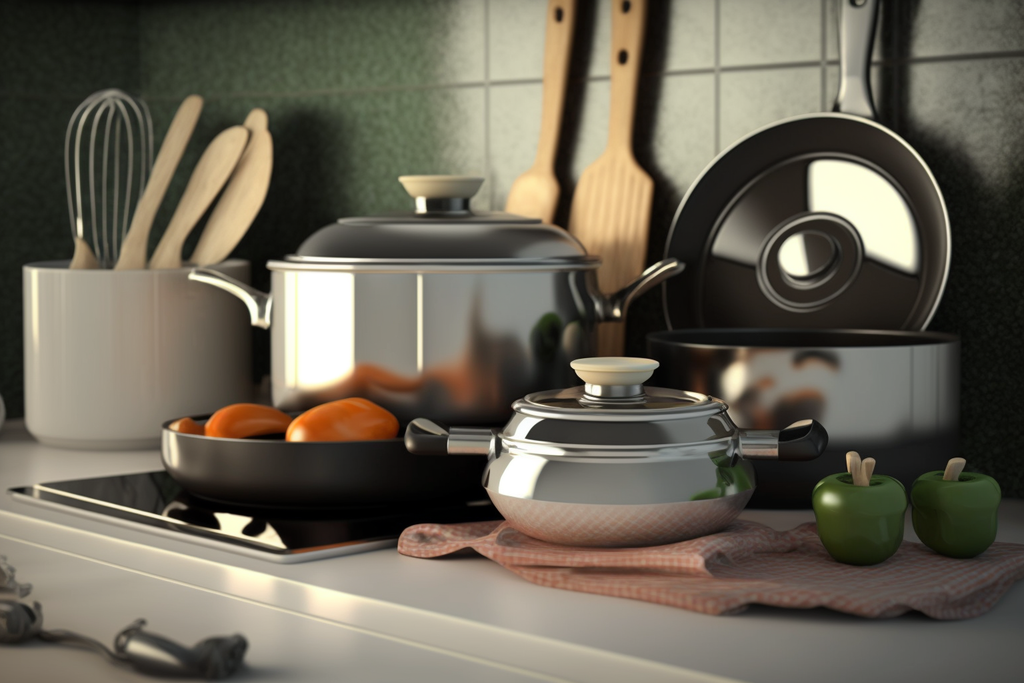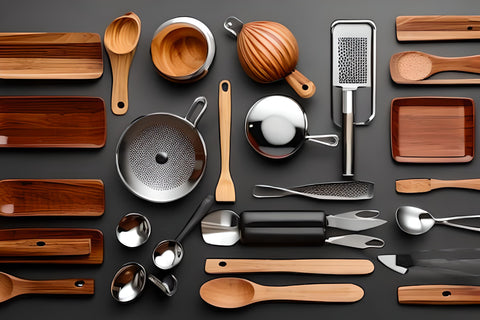Kitchenware is an important aspect of any kitchen, and it can be one of the most important investments you make when it comes to cooking. However, many people mistake cookware for kitchenware, but they are not the same thing.
In this article, we will explain what is considered kitchenware and the difference between kitchenware and cookware. Kitchenware refers to a range of items and tools that are used in the kitchen for food preparation and serving.
This includes all of the utensils, dishes, and tools that you use to cook, prepare, serve, and store food. It includes but is not limited to, knives, dishes, pots, pans, utensils, glassware, linens, and even appliances like mixers, ovens, refrigerators, dishwashers, etc.
What is the Difference Between Kitchenware and Cookware?
Cookware denotes any item used specifically for the cooking process itself such as pots, pans, and baking dishes.
These are items that are used directly on the heat of the stove or oven to cook the food. While kitchenware encompasses all kitchen utensils, including cookware, it’s important to note that cookware is a subcategory of kitchenware.

Types of Kitchenware
Kitchenware is a vast category, and many subcategories exist under it, e.g. cutlery, which includes the utensils you need for cutting food, such as knives, peelers, and scissors. There are many kitchenware brands that specialize in each subcategory. Another one is tableware which includes the dishes and utensils you use to serve and eat food, such as plates, bowls, glasses, and silverware. Also, we have small appliances like toasters, blenders, and mixers.
Choosing Your Kitchenware
When it comes to choosing kitchenware, there are many factors to consider such as material, function, durability, and price. Material is an important factor because it affects the performance and durability of the kitchenware. Furthermore, paying attention to the function ensures you get the right kitchenware for your needs. Lastly, the price of the kitchenware is also a factor to consider, as you would want to make sure you’re getting the best value for your money.
Maintenance and Care
To ensure your kitchenware lasts long, proper care and maintenance are crucial. Cleaning should be done according to the material e.g. wooden utensils should not be soaked in water for a long time while stainless steel ones can be put in a dishwasher. Also, properly storing and drying kitchenware would prevent the growth of bacteria or mold, ensuring keeping them in a dry and well-ventilated place. Different types of kitchenware come with different care instructions, so make sure to follow the manufacturer's instructions. To keep your knives sharp, sharpen them and hone them regularly.
Storage and Organization Solutions for Kitchenware
To make the most out of your kitchen space, proper storage and organization solutions are key. Consider organizing your kitchenware according to function or frequency of use. Some solutions include utilizing kitchen drawers or using hanging racks, or storage containers. Also, you can use shelf organizers or drawer dividers to maximize space and keep things orderly.
Sustainability and Environmentally Friendly Kitchenware
There is an increasing focus on sustainability and being environmentally friendly, and this also extends to kitchenware choices. There are many options to choose from, for example, bamboo utensils are made from sustainable material, and are biodegradable and eco-friendly. Furthermore, opting for durable kitchenware means less waste and less frequent replacement.
Safety Considerations
Kitchen safety is very important and should be a top priority. When selecting kitchenware you would consider safety features such as handles that stay cool to the touch or utensils which are safe to use with non-stick cookware. Also, store sharp objects like knives properly to avoid accidents, and finally, ensure that electric appliances have safety features like automatic shut-off or safety locks.
The Importance of Kitchenware on Food Quality

Last but not least, it is important to note that high-quality kitchenware can have a significant impact on the quality of the food you prepare.
The right tools can make it easier to cook food evenly, control temperature, and avoid burning.
Using appropriate cookware for different cooking methods and the right knife for each type of food can make all the difference in the end result, and it can also make the cooking process more enjoyable.
Conclusion
Kitchenware is an essential aspect of any kitchen, and understanding the difference between kitchenware and cookware is key to building an efficient and functional kitchen.
Kitchenware is a broad category, encompassing everything from utensils to small kitchen appliances, while cookware is a subcategory of kitchenware, specific to pots, pans, and other tools used for cooking. When selecting kitchenware, it’s important to consider the material, function, and price, as well as the care required to ensure they last a long time.
FAQ
Is it essential to follow the manufacturer's instructions for care and maintenance?
Yes, following the manufacturer's instructions can help prolong the life of your kitchenware, protect your warranty on the product, and ensure they are used and maintained safely.
Do all kitchenware products have the same care and maintenance requirements?
No, different types of kitchenware come with different care instructions, for example, wooden utensils should not be put in the dishwasher while stainless steel items can in many instances.

Can I repair damaged kitchenware instead of replacing it?
It depends on the type of damage and the material of the kitchenware, some can be repaired while some kitchenware can be unsafe to use if damaged.
How do the different types of kitchenware affect the taste or texture of the food?
Each type of material has its own unique properties that can affect the taste or texture of food, some can distribute heat evenly and avoid hot spots or burning, while others can prevent sticking to the surface.
How can I know if my kitchenware is food-safe and free of toxins?
Always look for verified seals and certifications that ensure they meet safety standards, and check for any potential contaminants.
ABOUT THE AUTHOR
Olivia Poglianich
Content Strategist
Olivia Poglianich is a nomadic brand strategist and copywriter in the wooden crafts and 3D product design space who has worked with brands such as Visa, Disney and Grey Goose. Her writing has taken her all over the world, from a Serbian music festival to a Malaysian art and culture event. Olivia is a graduate of Cornell University and is often writing or reading about travel, hospitality, the start-up ecosystem or career coaching. Her latest interests are at the intersection of web3 and communal living, both on and offline.






